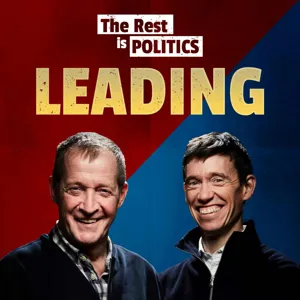Podcast Summary
Uncertainty surrounds Spain's future political direction after no single party secures a majority: The recent Spanish general election resulted in no clear winner, leaving the formation of a stable government uncertain and causing concern among voters.
The political landscape in Spain underwent unexpected developments in a recent general election, with no single party securing a majority. The center-right People's Party and the far-right Vox party both failed to achieve this goal, leading to uncertainty regarding the country's future political direction. The socialist party, led by Pedro Sanchez, and its left-wing ally also fell short of a majority. This situation stems from a period of instability in Spain, marked by two elections in 2019 and a tense political climate. The election results have left the formation of a stable government unclear, with potential negotiations involving parties further from the political center. The unexpectedly close race between the center-right and far-right parties has caused concern and uncertainty among many voters.
The Spanish Election: A Polarized Situation: The Spanish election resulted in a hung parliament, with the socialists performing better than expected and both the center-right PP and far-right Vox underperforming, leaving an uncertain future political landscape
The Spanish election resulted in a polarized situation with the center-right party, the People's Party (PP), and the far-right party, Vox, gaining significant attention. The PP, under its new centrist leader, Alberto Nunez Feijoo, had been moving back to the middle on policy and tone, but lacked a majority of seats. In search of a partner, they looked to the hard-right Vox party, which opposes regional autonomy, liberal social issues, and immigration. Vox, a splinter group from the PP, also attracts supporters unhappy with changes to Spain's traditional way of life. The election saw the socialists performing better than expected, while both the PP and Vox underperformed. As a result, neither the socialist coalition nor the two-party bloc on the right holds a majority, leaving everyone uncertain about the future political landscape.
Uncertainty in Spanish Politics Following Elections: The Spanish political landscape remains uncertain after recent elections, with no clear coalition emerging for forming a government. Negotiations between major parties could lead to a grand coalition or continued elections later in the year. Separatist parties and the far-right could pose challenges to the formation of a government.
The political landscape in Spain following the recent elections is uncertain, with no clear coalition emerging for forming a government. The king will consult with major party leaders to try and form a coalition, but the absence of a majority coalition could lead to repeated elections later in the year. A potential roadblock to the formation of a government is the separatist party Juntas in Catalonia, which has expressed unfavorable views towards Pedro Sanchez and has refused to support him. Another possibility is a grand coalition between the two major centrist parties, the People's Party and the Socialists, which together have the support of about 65% of the Spanish electorate. However, this has never been done before in Spain, and negotiations would be challenging. Additionally, the far-right party Vox, which had been expected to make significant gains and potentially enter government, saw a decrease in support this time around, indicating that Spanish voters may be more inclined towards centrist government. Overall, the elections have resulted in a chaotic situation, but it appears that the fear of a significant rise of the far-right in Spain may have been overblown.
Mint Mobile offers discounted price to help consumers cope with inflation: British artist Norman Wilkinson introduced dazzle camouflage during WW1, painting ships with large geometric shapes to confuse enemies, Mint Mobile now offers discounted price to help consumers navigate inflation
Mint Mobile, a wireless service provider, is offering a discounted price of $15 a month for new customers, aiming to help consumers cope with inflation. This offer comes after a viral moment during the Russian invasion of Ukraine, where Ukrainian border guards famously told off Russian naval officers with a bold and derogatory response. In the naval world, Russia has been employing optical illusions by repainting ships with white midsections to make them appear smaller. This technique, known as dazzle camouflage, has a long history in naval warfare, with its origins dating back to the First World War. The British artist Norman Wilkinson developed this method by painting ships with large geometric shapes in contrasting colors to confuse enemies. While the effectiveness of this tactic is disputed, it's an intriguing example of how innovation and creativity have played a role in military strategy.
Using contrasting colors and stripes to confuse enemy perception during WW2: During WW2, dazzle camouflage helped ships evade torpedo attacks by confusing human perception of their size and shape. Today, with the resurgence of visual recognition in naval warfare, paint jobs like the ones used on the Essen are making a comeback to add confusion and potentially help ships avoid detection.
During World War 2, navies used dazzle camouflage to make it difficult for enemies to judge the shape and orientation of their ships, which was crucial in evading torpedo attacks from submarines. This was achieved by using contrasting stripes and colors to confuse the human perception of the ship's size and shape. After the war, the use of camouflage paint schemes declined as ships were mainly detected via radar and sonar. However, with the recent resurgence of visual recognition in naval warfare, with the use of drones and limited video feeds, paint jobs like the ones used on the Essen are making a comeback to add confusion and potentially help ships avoid satellite tracking. This historical use of camouflage and its modern-day relevance demonstrates the importance of understanding and manipulating human perception to gain an advantage in warfare.
AI can be easily deceived by high-end operators using sophisticated methods: AI systems can mistake objects for something else, while human analysts can distinguish them. Deception is a low-cost investment for a small chance of avoiding detection.
Relying on artificial intelligence for detection and surveillance can be easily fooled, especially when it comes to high-end operators using sophisticated paint schemes or adversarial examples. These methods can make machine vision systems mistake objects for something completely different, while human analysts can easily distinguish them. For instance, a team once created a 3D-printed turtle that machine vision mistook for a rifle. The cost of such deception is relatively low, making it a worthwhile investment for a 1% reduction in the chances of being spotted or targeted. Meanwhile, in a completely unrelated discussion, Anya Hinmarch, a British fashion designer, shared her thoughts on the false dichotomy between transforming a bottle of ketchup into a handbag or a flavor of ice cream. At an ice cream project in Central London, one can find both options, including an ice cream tasting of mellow cheddar cheese and Branston pickle, which turns into a mild chocolate ice cream, and one flavored with lemon curd. Despite the higher price tag of the tote, the ice cream offers a more affordable alternative for Londoners.
Ice Cream's Universal Appeal: From Childlike Pleasure to Cultural Innovations: Ice cream's enduring appeal lies in its fundamental simplicity and delight, connecting us to childhood memories and providing profound pleasure, despite the trend towards sophisticated and unusual flavors.
The appeal of ice cream transcends cultural boundaries and innovations, tapping into our childlike pleasure and universal desire for sweet indulgence. From historical experiments with savory additions like parmesan and pig blood, to modern creations like mac and cheese and ranch dressing flavors, ice cream's charm remains rooted in its fundamental simplicity and delight. Despite the constant pursuit of sophisticated and unusual flavors, the enduring joy of ice cream comes from its connection to our childhood memories and the profound pleasure it brings. So, while people may be intrigued by the latest Branston Pickle or Coco Pops ice cream, it's the classic, comforting favorites that keep us coming back for more.






